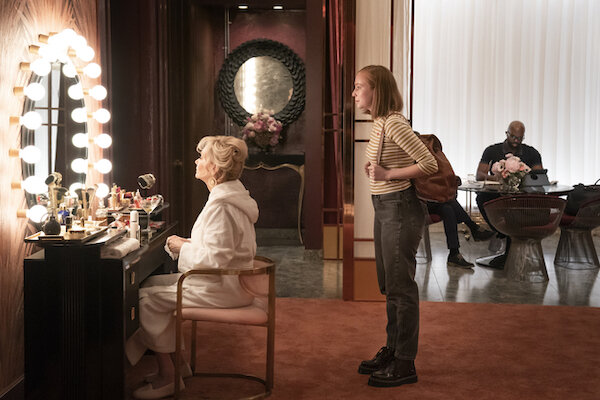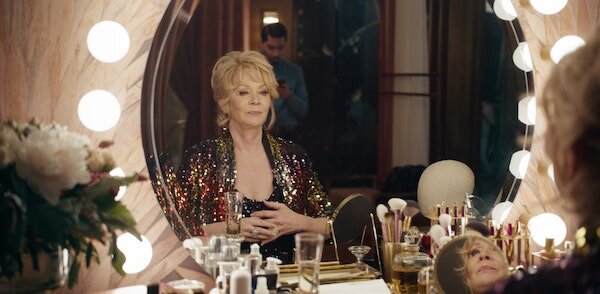Queer mommy issues are nothing to joke about, yet the now Emmy-winning show Hacks explores the dynamic with sensitivity and depth. Mother-daughter relationships affect both parties, and zones in on the anxious/avoidant attachment that nature often creates – a rare feat to shed light on in a show about a standup comedian and her ghostwriter. Meggie Gates reflects on her own relationship with her mother as a lesbian, and the special recognition the HBO show gave her.
The Las Vegas lights blanket the strip as Ava Daniels (Hannah Einbinder), a struggling Gen-Z comedian, calls her mother after an especially harrowing day at work. Her boss, the talented comedian Deborah Vance (Jean Smart), has alienated Ava, forcing her to spend the entire day buddying up to Deborah’s daughter DJ (Kaitlin Olson). After realising what a tumultuous mother-daughter relationship the two have, Ava calls her mom hoping to patch up their own issues.
Unfortunately, things do not go as planned.
Hacks follows the relationship between Deborah and Ava, her ghostwriter, as they work together to revamp Deborah’s old material. Faced with losing her residency at the Palmetto resort on Friday and Saturday nights, Deborah pushes herself to become a better performer by embracing her past. Along with that comes confronting past demons: her failed marriage, her deceptive sister, and the person most impacted by it all – her daughter.
Mommy-daughter issues are nothing to joke about yet, Hacks finds a beautiful way of making the heavy humorous. The anxiety found in such a formative and tumultuous relationship hit home, as I watched the show and thought about my own highly-strung mother. Watching Ava, a queer 20-something, navigate her mother’s emotions at the expense of her own is visceral. “You’re in such an unstable career!” her mum yells, and I feel how eerily similar we are.
The unlikely pairing of Ava and Deborah foils typical mother-daughter relationships. After Ava is “cancelled” for a homophobic joke about a closeted senator, she is deemed unhirable as a comedy writer in Los Angeles. Scrapping for a job, her manager Jimmy places her under Deborah’s employment without Deborah’s knowledge. As their relationship grows from a place of distrust to mutual respect, the bumps they hit along the way highlight healing found on both ends of the spectrum. Deborah learns communication with DJ through Ava and, subsequently, Ava learns how to meet her mom’s meltdowns with patience and sincerity.
The “gays with mommy issues” trope gains momentum in episode 4, D’ Jewelry. Following Deborah on the street, a TMZ reporter takes ugly photos of her before she enters her daughter’s apartment. Finally, DJ has gotten her mother to sit down and look at her jewellery, hoping this will result in a partnership with QVC Television Network. Instead, Deborah insults her jewellery for looking like “mall kiosk necklaces,” prompting DJ to storm off and take Ava with her. At a trade show where jewellers buy and sell each other's merchandise, the two bond over Deborah’s cold demeanour, remembering how she bullied Ava, and how she selfishly chose a career over her child.
Despite DJ’s unstable attitude, Hacks doesn’t make it easy to villainise her mother. In episode 7, Deborah throws a party for DJ’s birthday, admitting in a pre-dinner toast that the reason she brought DJ with her on the road was because she wanted to remain close to her only daughter after losing her parents at a young age. Iin the same episode, Ava has a sex dream about Deborah and evaluates what this means about her own mommy issues, telling DJ: “I’m not actually attracted to your mom, I just have a fucked up sense of intimacy.” This botched dynamic between mother and daughter can in fact have a detrimental impact on building romantic relationships.
“Consequences from unstable mother/daughter relationships can come in the form of maintaining emotional or physical distance from other relationships, lack of trust, and lack of ability to develop attachment to others,” wrote Chicago-based-psychologist Dr. Jamie Wernsman.
Not only is this apparent in Ava’s inability to connect with her ex-girlfriend, but also through fellow queer co-star Marcus’ (Carl Clemons-Hopkins) inability to let go of control when presented with his first healthy relationship. Similar to Ava, Marcus looks to Deborah for validation. We’re given pieces of Marcus through his relationships – with his love interest Wilson (Johnny Sibily) but also with his mother (Angela Elayne Gibbs).
When introducing Wilson to his mother, tensions arise and Marcus opens up about how she, similar to Deborah, did a lot of things out of her own self-interest. This behaviour impacts not only blood relations but romantic ones too.
Both Ava and Wilson have troubling connections to their mothers – being simultaneously held at arm's length and smothered beyond control. In episode 8 “1.69 Million”, where Deborah goes to San Diego with Ava and Marcus stays behind, Marcus’s relationship with his mom feels increasingly hot and cold. After being unsupportive when he came out, Marcus’ mother eventually had to step in as a support system after his father passed away. Though Ava’s mother’s feelings on her queerness are never mentioned, Marcus’s relationship with his mother relies heavily on this aspect of his life – a “yas queen” or “sis” thrown into every conversation.
This overcompensation on his mom’s end, (she purchases poppers as a stocking stuffer for Christmas), comes as a source of discomfort for parents dealing with queer kids, a way of bypassing building a sturdy relationship with their kids by asking deeper questions about their sexuality.
“The tactic is to insult and demean gay people when they come out by saying they already knew they were gay,” writes Cyd Ziegler for OutSports. “The underlying message is that these gay people fit stereotypes so badly that they didn’t actually have to “come out.”
Generational differences often play a big part in parents not understanding their child – a dynamic which plays out in Ava and Deborah’s relationship. The two are unable to see from the other’s point of view because they come from different times, one a comedian from the ‘90s and the other,a Gen-Z performer born and raised on Twitter. But as their friendship heals, their mother-daughter relationships heal with it. In the season finale, Deborah soothes DJ’s pain by asking her for permission to discuss their relationship on stage and Ava comforts her mom through her father’s sudden death, making an effort to bury their tension in lieu of tragedy. At the heart of misunderstanding, there’s care.
“The mother-daughter relationship is not difficult to understand once we realize that mothers and daughters do not relate in a cultural vacuum,” writes Rosjke Hasseldine on Counseling Today. “Life events, restrictive gender roles, unrealized career goals, and the expectation that women should sacrifice their needs in their caregiving role shape mothers and daughters' view of themselves and how they communicate.”
I call my mom after every episode of Hacks, desperate for our relationship to be healthy again. Watching Ava and her mother interact sparks a sense of familiarity and discomfort, a feeling of misunderstanding and loneliness that’s isolated me for a long time. The finale airs and Ava has a conversation with her mom that escalates catastrophically, triggering my fight or flight response. I tell my mom I love her before I hang up and she does too, telling me how proud she is of me.
Our relationship may not be perfect, but it is perfectly ours.
Meggie Gates is a comedian and writer in Chicago, IL. Their work has appeared in Consequence of Sound, Bitch Media, Collider, and Instyle. Their feet have appeared on Wikipedia.



